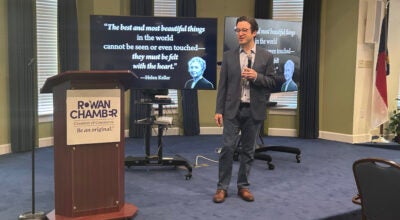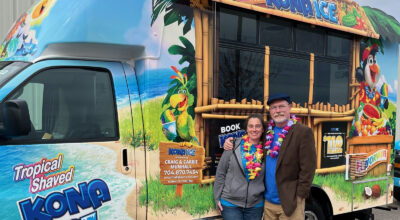SBA a way for some to get business going
Published 12:00 am Saturday, May 21, 2011
By Emily Ford
eford@salisburypost.com
SALISBURY — Sam Ketner and Nate Brown graduated from Catawba College in the midst of the Great Recession.
Friends and soccer teammates, the business majors found themselves in May 2008 with no prospects for meaningful employment.
“We couldn’t find jobs, so we decided to make our own,” Brown said.
Ketner had interned at a local car dealership, so they parked their own vehicles on a lot they’d leased on Jake Alexander Boulevard.
Within hours, they’d sold Brown’s 1996 Ford Ranger for $3,000 — $500 more than he’d paid for it. They used the money to buy two more cars, which also sold quickly.
Two entrepreneurs, and a new business called Auto House, were born.
Within six months, they were selling a dozen cars a month. Within two years, they were up to 50 cars a month and had outgrown the location.
They needed capital to expand.
But they didn’t have the business history required for a conventional loan, and lenders turned them down twice.
“At our age, a traditional commercial loan was out of the question,” said Ketner, 24.
Brown is 25.
Lenders wanted five years of business income tax returns, they said. So they turned to the U.S. Small Business Administration.
Through Community Bank of Rowan in Salisbury, Ketner and Brown qualified for an $815,000 SBA loan with a fixed rate for 25 years.
They bought the former Sagebrush restaurant on Jake Alexander Boulevard, painted it red, white and blue and hired more people.
Auto House is the kind of business SBA loans are designed for, said Heidi Whitesell, the commercial SBA vice president for Community Bank of Rowan.
“For startups or young companies who haven’t been in business for more than a few years, it’s a way to access capital that they may otherwise not be able to,” she said.
The loans, which are issued through banks according to government guidelines and receive some protection against losses if the borrower defaults, offer fixed rates and longer terms than conventional loans.
“People shy away from SBA because they think you have to jump through all these hoops,” Whitesell said.
As a preferred lender, Community Bank of Rowan can process SBA loan applications locally, usually within a week or two, she said.
For start-ups that need a business plan to qualify, Whitesell said free help is available through Rowan-Cabarrus Community College and the Service Corps of Retired Executives.
Whitesell is trying to spread the word about SBA loans, which are available at several local banks, including Wells Fargo, BB&T, SunTrust and Bank of North Carolina.
“We want people to know that there are resources out there that your government is supporting, and they should take advantage,” Whitesell said.
While banks compete against each other and offer different rates, the SBA has a maximum fixed rate of 8.99 percent on a 25-year loan for real estate.
SBA loans are available to businesses under a certain size, depending on the industry, and can be used for working capital, payroll, equipment and inventory purchases and more.
“People don’t know that money’s out here,” Whitesell said.
Last year, Community Bank of Rowan approved 60 percent of about 100 applicants. From October 2010 through March 2011, the bank issued 16 SBA loans worth $8.4 million.
More people applied for SBA loans last year because the government used stimulus funds to waive fees.
Fees are sometimes a deterrent, Whitesell said.
Joe Fowler said fees and other requirements made the SBA loan application process a hassle.
“Everything I heard for a couple years that kept me from doing SBA turned out to be true,” Fowler said.
Fowler, who was laid off in 2009 from the National Wild Turkey Federation after 20 years, pursued an SBA loan for his new business, Open Season. He’s producing a variety of products under the label, including dog food, sweet potato butter, cutlery and custom barbecue cookers.
He needed $15,000 for inventory and start-up costs and applied for an SBA loan through a California-based bank that does business in North Carolina. But faced with $1,000 in fees, plus a requirement to pay for online training, Fowler said he became uneasy.
He called U.S. Sen. Kay Hagan’s office and confirmed the bank was legitimate, but ultimately, Fowler went another route — credit cards. With two zero-interest credit cards, he said he can launch his business and not pay SBA fees.
Whitesell said although applicants may pay more in fees on an SBA loan compared to a conventional loan, it’s worth it to have an interest rate locked in for 25 years.
Fees between 2 percent and 3.5 percent are figured on the amount of the loan that’s guaranteed by the government.
Ketner and Brown paid a 3 percent fee on 75 percent of their loan, or about $18,000.
“We chalked it up to the cost of doing business,” Brown said.
With 11 fulltime employees, Brown and Ketner are considering expanding in a year by adding a second location, possibly in Mooresville or Gastonia.
“We couldn’t have done it without SBA,” Ketner said.
SBA?loans
• 7(a) loans are used for working capital, real estate, purchases and debt refinance. Loan terms up to 25 years and loan size up to $5 million.
• 504 loans are used primarily for real estate, as well as construction and heavy machinery. Terms between 10-20 years, project size usually $5 million or less.
• Express loans offer working capital revolving line of credit, up to 7-year term and loan size up to $1 million.
• Patriot Express loans are for veterans and members of the military community. The lowest interest rates, generally 2.25 percent to 4.75 percent over prime.
Contact reporter Emily Ford at 704-797-4264.




